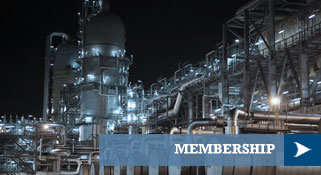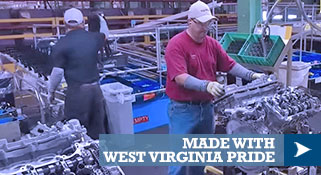- Details
 WHITE SULPHUR SPRINGS, W.Va. — Encova Insurance, in partnership with the West Virginia Manufacturers Association (WVMA), presented the annual Encova and WVMA Safety Award during the WVMA Winter Convention and Annual Meeting, held December 7 in White Sulphur Springs, W.Va.
WHITE SULPHUR SPRINGS, W.Va. — Encova Insurance, in partnership with the West Virginia Manufacturers Association (WVMA), presented the annual Encova and WVMA Safety Award during the WVMA Winter Convention and Annual Meeting, held December 7 in White Sulphur Springs, W.Va.
The 2021 Encova and WVMA Safety Award was presented to J.H. Fletcher & Co. of Huntington. The company is one of the top global producers of custom underground mining equipment and has provided engineering and manufacturing solutions since 1937.
Lisa Hamrick, senior business development manager at Encova, presented the safety award to J.H. Fletcher & Co. during the Encova Safety Award Luncheon at the WVMA Winter Convention.
“It is a great honor for us to present this award in partnership with WVMA,” Hamrick said. “At Encova, we are aware that a culture of workplace safety requires education, commitment and dedication from the employer. This award is our way of recognizing those employers who choose to make safety paramount.”
Fletcher CEO Greg Hinshaw accepted the award, joined by company President and Vice Chairman Rod Duncan, and Dave Cooper, retired vice president of risk management.
- Details
I watched with interest the protesters in Washington, D.C., recently who participated in the People vs. Fossil Fuels.
Aside from the obvious questions about how the protesters got to D.C., probably with fuels, vehicles and on roads derived from coal, oil and gas, wearing clothes made of fossil fuel derivatives and eating food raised and transported in similar fashion, one wonders whether they understand what they are asking.
They are asking for power that is inherently intermittent, and not always available. The sun doesn’t shine at night, the wind doesn’t blow all the time.
- Details
West Virginia’s manufacturers form the foundation of communities across the state. Manufacturing in our state has an economic output of $7.5 billion and employs 50,000 West Virginians in generational jobs who make the products America relies on.
For years, our great state has touted affordable energy. But the truth is that, while electricity prices in the PJM Interconnection (the grid in which West Virginia is one of 13 states) are competitive, our state arguably has missed out on benefits of competition because of traditional regulation that, among other things, requires ratepayers to bear the burden of costs for utility-owned power plants.
Across the regional grid that West Virginia shares, independent power producers bring on affordable wholesale power generation that is sold to the grid as needed. This has not only lowered prices for other states across the interconnection, but emissions, as well.
- Details
You may have seen that some members of Congress are attempting to generate funds for infrastructure development by raising corporate tax rates. WVMA is no stranger to infrastructure development, but I want to emphasize that there are parts of this plan that will do more harm than good.
The effect of corporate tax fluctuations impact not only manufacturers and small businesses, but also job creation and economic activity. I’ve recently written about this — as West Virginia’s communities continue toward recovery from the COVID-19 pandemic, it is important that our legislators continue to consider tax reforms that encourage business growth and development in order to foster job creation and help workers navigate the post-pandemic landscape.







